
Dentures & Partials – New Haven, CT
Functional, Custom-Made Tooth Replacement

Dentures have been helping patients regain their confidence and ability to chew their favorite foods for many years. Across the decades, they have evolved to become more functional and natural-looking than ever before. At New Haven Dental Group, we proudly offer both full and partial dentures to patients who have lost multiple teeth. If you are missing several — or even all — of your teeth, one of these treatments may be suitable for you.
Why Choose New Haven Dental Group for Dentures and Partials?
- Experienced team of restorative dentists
- Traditional and implant-supported dentures available
- Custom-made, natural-looking restorations
Who Is a Good Candidate for Dentures?

Almost anyone who has lost multiple teeth could benefit from dentures. Of course, when you visit us for your consultation, we will carefully examine your gums and other aspects of your oral health to determine if your mouth can support a prosthetic. From there, we can discuss your treatment options. Even if you are not a candidate for dentures right away, you may become one after some strategic preparatory procedures.
Effects of Missing Teeth

Missing teeth can be the result of numerous factors. For example, genetics, gum disease, accidents, and lifestyle factors can all contribute to tooth loss. Regardless of what caused your current condition, you may face some significant challenges because of it.
For example, you might feel self-conscious about the appearance of your smile and the hollowness of your cheeks. Because of that, you might shy away from social interactions and miss out on meaningful relationships. Additionally, a lack of ability to enjoy your favorite foods may lead to a degree of malnourishment and dissatisfaction with your diet.
The good news is that dentures can often help to correct such issues.
What Qualifies You for Dentures?

You may qualify for dentures if:
- You are missing all or most of your teeth throughout one of your dental arches. If you are missing just a few teeth, a different treatment option may be better for you.
- Your gums and jawbone are healthy enough to support dentures. If they are not currently, you may need some restorative care before moving forward with tooth replacement.
- You want a cost-effective and convenient form of tooth replacement.
Alternative Tooth Replacement Options
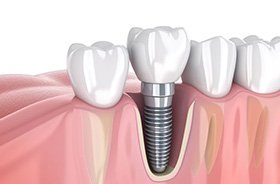
If dentures are not quite right for you, you might be a good candidate for an alternative form of tooth replacement, such as:
- A dental bridge. This type of prosthetic is fixed onto the teeth that surround an empty space. A bridge can be sturdy, durable, and aesthetically pleasing. The biggest drawback of this option is that it requires the supporting teeth to be significantly modified.
- Dental implants. Dental implants are small titanium posts that we surgically place beneath the gumline. After they integrate with the surrounding tissue, they can support crowns, bridges, and dentures. Due to their stability, longevity, and other benefits, we often recommend implants as the best tooth replacement option.
What Are Full and Partial Dentures?

A full denture is a removable prosthesis that replaces an entire arch of missing teeth. It consists of a gum-colored base and a row of artificial teeth, which are usually made out of porcelain or acrylic. Natural suction or a mild adhesive helps a full denture to remain in place.
A partial denture replaces several missing teeth at various places throughout a dental arch. You can think of it like a puzzle piece that fits in exactly where it is needed. It allows patients to retain their remaining natural teeth while still enjoying all the benefits of a denture. Small attachments help a partial denture to remain secure in the mouth during eating and speaking.
Many patients are candidates for implant-supported dentures, which are anchored in the jawbone via small titanium posts. This page focuses primarily on traditional dentures, but you can read more about dental implants and their many benefits on our website’s dental implant page.
Benefits of Dentures

Tooth loss can have profound consequences on your daily life. It may adversely affect your confidence, your self-image, your nutrition, your oral health, and other aspects of your wellness. The good news is that dentures can reduce or even eliminate many of the trials that result from edentulism (the state of being toothless). Would you like to learn more about dentures and how they might be able to benefit you personally? Continue reading below.
Psychological Benefits

Multiple structures, including the teeth and tongue, play an important role in producing clear speech. Without teeth, you may find it difficult to enunciate certain sounds. Your speech might even sound a bit muddled. You may find such challenges to be embarrassing.
When you first get dentures, you might develop a slight lisp. After some time and practice, though, your speech should be clearer than it was before you got dentures.
Clearer Enunciation

You may qualify for dentures if:
- You are missing all or most of your teeth throughout one of your dental arches. If you are missing just a few teeth, a different treatment option may be better for you.
- Your gums and jawbone are healthy enough to support dentures. If they are not currently, you may need some restorative care before moving forward with tooth replacement.
- You want a cost-effective and convenient form of tooth replacement.
Improves Nutrition

Edentulism can make it difficult or even impossible to enjoy a wide variety of foods. You might miss out on the nutrients in items like fresh fruits and veggies, as well as certain types of meats. Your overall health could suffer as a result.
With dentures, you can look forward to enjoying a wide variety of snacks, meals, and treats. In fact, after you get used to eating with your prosthetic, very few foods will be off-limits for you.
Preserves Oral Health

If you still have some of your natural teeth, dentures might benefit you in at least two ways:
- Prevention of dental drift. After the extraction of some teeth, the remaining teeth may drift out of place, leading to a misaligned bite and a heightened risk of further tooth loss. Dentures can prevent such issues.
- Reduced wear and tear. Because dentures can bear some of the stress of chewing, they can reduce premature wear on your natural teeth.
Expands Opportunity

Sadly, poor oral health could adversely affect your career. Obvious tooth loss might even make it more difficult for you to secure a promotion or get a job with a new company! Dentures, on the other hand, can help you to convey a powerful and positive impression. They can send the message that you are youthful, successful, and approachable. They might just give you the added advantage you need to achieve your goals.
What to Expect with Dentures
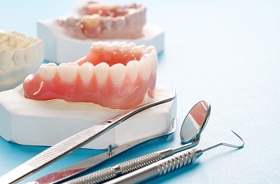
The denture process is not the same for every patient. Some individuals must first undergo tooth extractions. Following the extractions, you may have to wait several weeks while your mouth heals before our team can design your dentures. Or, you might opt for an immediate denture, which is placed on the same day as the extractions. An immediate denture must be adjusted soon thereafter to accommodate the changes in the mouth that happen following tooth extractions.
After you get used to using your dentures, you will still need to visit our team periodically for checkups and adjustments to your prosthetic. A traditional denture usually lasts for 5 – 8 years before changes in the patient’s mouth reach the point where minor adjustments are no longer able to make the denture fit well. Thereafter, you will have to get an entirely new denture.
Would you like to learn more about dentures and partial dentures and how they may be able to benefit you? Contact New Haven Dental Group today to schedule a consultation.
Dentures Aftercare

Even if you no longer have any of your natural teeth, you still need to take care of your smile! A major component of doing so is attending regular checkups with our dental team. During these appointments, not only will we check on the health of your gums and other oral tissues, but we will also help you to keep your prosthetic in good shape. From time to time, it may need to be relined (adjusted), and we want to stay on top of maintaining it!
Of course, dental checkups are just one aspect of keeping your smile in good shape. Here are some additional tips for dentures aftercare.
Remove After Eating
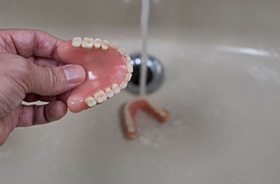
It is a wise practice to remove your dentures after each meal so you can rinse them. This helps to remove food particles and bacteria, which reduces the risk of bad breath, denture sores, and other issues. Keep in mind that you should not use hot water for this; high temperatures could warp your dentures and cause them to lose their snug and comfortable fit.
Clean Your Restoration
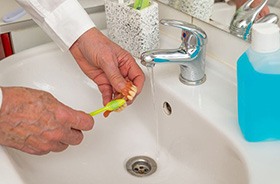
Even if you are diligent about rinsing your dentures after each meal, you should still take time to thoroughly clean them each night. Use a soft-bristled brush and a mild cleaning agent to scrub all their surfaces. (Do not use regular toothpaste because it is too abrasive.) You should also regularly soak your dentures in a cleansing solution, which can help with deeper cleaning. Be sure to rinse your dentures before placing them back in your mouth.
Keep Your Dentures Safe
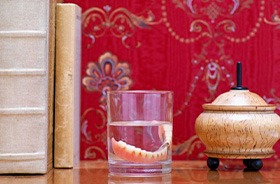
To protect your dentures from damage, you should:
- Protect them from hard falls. When you remove your dentures, try to do so over a soft surface, such as a folded towel or a sink full of water. They should have an easy landing if you accidentally drop them.
- Store them somewhere safe. Be sure to store your dentures someplace where a curious pet or small child will not be able to get ahold of them.
Remove When You Sleep

You should not sleep while wearing your dentures. Doing so could place extra stress on your gums and interfere with blood circulation. Studies have even shown that sleeping with dentures is associated with a higher risk of oral plaque and pneumonia. In contrast, removing your dentures at night allows you time to thoroughly clean them and gives your gums a chance to rest. Store them in water or a cleansing solution overnight so they do not dry out and lose their shape.
Notice Changes

If you ever notice any significant changes in your dentures or oral tissues, you should schedule a dental appointment right away. For example, you should visit us if:
- Your dentures do not fit as well as they used to.
- You are using more adhesive than usual to keep your dentures in place.
- Your dentures are damaged.
- You are experiencing oral pain.
All-on-4 Dentures

In many ways, caring for All-on-4 dentures is similar to caring for natural teeth. You should:
- Brush twice a day using a soft brush and non-abrasive toothpaste. Abrasive toothpastes, such as those containing baking soda or bleaching agents, could damage your prosthetic teeth.
- Floss daily. Use a floss threader or WaterPik to clean under your dentures. Alternatively, you could use a small tool known as a sulcus brush.
- Use antibacterial mouthwash to protect your dental implants from infection. You can ask our team for specific product recommendations.
- Follow other best practices, such as attending regular dental visits and eating a nutritious diet.